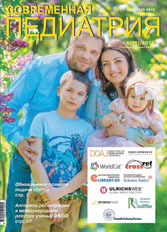Новые подходы к оценке состояния здоровья детей школьного возраста
DOI:
https://doi.org/10.15574/SP.2016.76.44Ключевые слова:
дети школьного возраста, уровень соматического здоровья, вегетативный тонус, биологическая зрелостьАннотация
Статья посвящена актуальной проблеме — вопросам оценки состояния здоровья детей школьного возраста. Доказано наличие «безопасного» уровня здоровья у детей пубертатного периода, который расположен между 4-м и 5-м уровнями соматического здоровья по шкале экспресс-оценки. Предложен алгоритм оценки состояния здоровья детей пубертатного периода по компенсаторно-резервным возможностям организма, который позволит выявить изменения в состоянии здоровья детей на донозологическом уровне и своевременно применить профилактические мероприятия.
Ключевые слова: дети школьного возраста, уровень соматического здоровья, вегетативный тонус, биологическая зрелость.
Библиографические ссылки
Antypkin YG. 2005. The health status of children in the conditions of influence of different environmental factors. Art Treatment. 2: 17—23.
Apanasenko GL. 2009. Health protection for healthy: the problem in Ukraine and Russia. Ukrainskyi med chasop. 4(72): 122—124.
Apanasenko GL. 1992. Evolution of bioenergy and human health. Sankt-Peterburg, MGP «Petropolis»: 123.
Kvashnina LV. 2000. New approaches to the assessment of health status and diagnostics of its disorders in school-age children. Avtoref dis d-ra med nauk. Kyiv: 36.
Lukyanova OM, Kvashnina LV. 2004. The health of primary school children and ways of its correction. Perinatologiya i pediatriya. 1: 35.
Lasota TI. 2010. Functional state of children of primary school age in the process of adapting them to the school. Young sports science of Ukraine. Coll of Sciences works in the field of physical culture and sports: in 4 v. Lviv. 1;14: 63—67.
Medvedovskaya NV, Ponomarenko SD, Kulchytska TK. 2007. The health status of adolescents and the peculiarities of their way of life. Ukraine The Health of the Nation. 3—4: 27—30.
Nyankovskiy SL, Yatsula MS, Chykaylo MI. 2012. The health of schoolchildren in Ukraine. The Health of the Child. 5(40): 18—22.
Omelchenko TG. 2012. Monitoring of health status of schoolchildren in physical education – the actual problem of modernity. Physical culture and health: past, present, future. Materials of the International sciences-pract Conference the 100th anniversary of the first diploma teacher of physical culture. Kyiv Київ, University named B.Grinchenko: 327—332.
Omelchenko TG. 2011. Assessment of health status with the use of prenosological diagnostics of children of younger school age. Actual problems of theory and methodology of physical culture, sport and tourism. Materials of the IV International sciences.-pract. Conference of young scientists. Minsk: 244—246.
Tyazhka OV, Kozakova LM, Stroy OA. 2011. Modern features of the health of younger and middle age children of Kiev. The Health of the Child. 4(31): 12—16.
Yakovleva EB, Kasyanova NB, Churilova OA. 2006. Puberty – modern views on the problem. Ukr. med. Almanah. 9; 6: 163—164.
Ben Shlomo Y, Kuh D. 2002. A life course approach to chronic disease epidemiology: conceptual models, empirical challenges and interdisciplinary perspectives. Int J Epidemiol. 31: 285—293.
Hryhorchuk D, Freedmann L, Loukianova E et al. Predictors of blood lead among three6year old Ukrainian children. A nested case control study (Submitted in 2005 to International Journal of Ocupational and enviromental Health).

